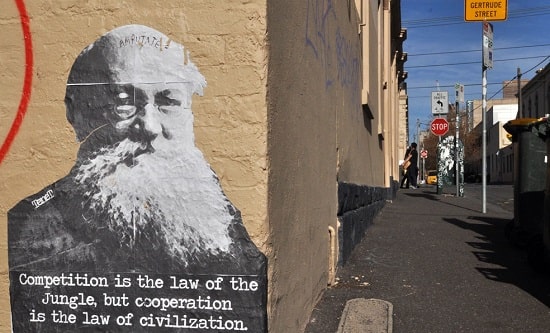
The term ‘mutual aid’ has emerged in wider usage recently and is claimed by the anarchist tradition to be the way forward for society in this time of environmental crisis and coronavirus pandemic. Readers may be interested in this term and its place in the history of ideas. The term was first popularised when Peter Kropotkin (1842-1921) published a series of articles in English brought together under the title Mutual Aid in 1920. Kropotkin, a Russian nobleman and revolutionary anarchist, lived in political exile in England for many years. He was also a naturalist and geologist who had spent years exploring huge tracts of Russia and Siberia and recording his observations.
Kropotkin read Charles Darwin’s The Origin of Species, first published in 1859, which was translated into Russian in 1863 and received enthusiastically. However, both reactionary lovers of old Slavic social formations of the village and the commune and progressive intellectuals disliked the rise of ‘Social Darwinism’ in England. The British elevated and narrowed Darwin’s evolutionary theory of natural selection to the ‘survival of the fittest’ as a rationalisation of the class system. Radical Russian commentators criticised this justification of social inequality as an expression of ‘the British national type’ and ‘imperial arrogance’, which starts from a position of national superiority. Building on the work of Malthus (1766-1834), who claimed that population growth was the source of poverty, the English Darwinian school of thought imposed a view of hierarchies of race and breeding (upper classes) as the natural law of nature in social structures. Darwin’s theory of evolution was appropriated in a reactionary and reductionist way.
Kropotkin had seen that in the vast and underpopulated tracts of Russia, the natural world did not compete for space. Instead of the competition of organism against organism there is the struggle of organism against environment. So, the little plant sheltering at the edge of the snow desert both protected and sheltered the insects that would pollinate it by what he called ‘mutual aid’.
Darwin himself described ‘the struggle for existence’ as a general term. ‘I use this term in a large and metaphorical sense including dependence of one being on another, and including (which is more important) not only the life of the individual, but success in leaving progeny. A plant on the edge of a desert is said to struggle for life against drought. As the mistletoe is disseminated by birds, its existence depends on birds…’ (Origin of Species).
Kropotkin erred in exactly the same way as the English Darwinists by finding intrinsic human values in nature. Eager to promote and justify his own vision, he extended his interpretation of natural law onto social organisation. Kropotkin and other anarchist tendencies viewed the state throughout history as the enemy of people, acting in its own interests and crushing the ‘natural’ and ancient commune. Together with contemporaries like Tolstoy and Gandhi, he believed that ‘mutual aid’, peace and love should be the guiding principles of society.
The communist movement also regards the centralised state as the enemy of the people but, following Marx and Engels, they see the formation of the modern capitalist (bourgeois) state as representing the specific class interests of the owners of private property (See Lenin’s The State and Revolution, 1917). The Bolsheviks wanted to smash the bourgeois state and replace it with a people’s state, as the first step towards the ultimate goal of the free association of people. The ultimate aim of communism is to achieve full economic democracy, planning to include all the population and give solidarity its fullest possible meaning – no exclusions, no privileges, no charity.
Today’s worldwide crisis of Covid-19 and environmental destruction is expressed by the stock market panic. The failure to immediately organise production and distribution in a medical emergency is a failure of ‘mutual aid’ on a global scale. Today people are organising to help each other within the political framework set by capitalist governments. Hundreds of ‘mutual aid’ groups across the country are attempting to mitigate the impact of the crisis without making the political demand for socialism: planned, organised production for use and not for profit. People have always supported and helped each other, in the home and the wider community, out of self-interest and mutual interest. But now we must struggle for socialism as the only solution to these crises. We have the ability and the resources to change the world to benefit all. Socialism is the only way forward or else we will descend into barbarism.
Susan Davidson
Fight Racism! Fight Imperialism! No 275, March/April 2020




